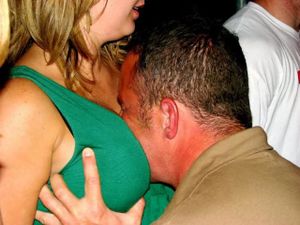UnNews:Venice bans motorboating
14 April 2013
The city of Venice has moved to introduce a partial ban on motorboating, a deviant sexual practice which has blighted the Italian tourist resort's historic Grand Canal.
The ban will initially be enforced only on Sunday afternoons, but will mean that almost all the usual traffic will be cleared from the Grand Canal. The aim is to draw attention to the city's consequent environmental problems, and to attract more families and fewer sex tourists to the town, notorious for its hordes of native busty women.
"In Venice, we say we are blessed with two things," says Francesco da Mosto, a true Venetian who rose to fame on the BBC's Venice series, "We have beautiful canals, and we have the chestiest woman in Europe."
"In many ways it was natural to combine the two, to show tourists the majesty of our town and the glory of our women's tette, but it has gone too far now, and we must prohibit motorboating. On Sundays. Between 2 and 4pm."
Historically Venice has been called "La Serenissima", meaning the "most serene" city. The name conjures an idyllic image of the city's beautiful old palaces dotted along the banks of its peaceful canals.
However, the day-to-day reality of life in Venice can be rather less serene: around 7,000 of Venice's gondolas are devoted exclusively to pleasuring sex tourists. They are an essential part of the private and commercial lives of many Venetians, but the sound of buzzing, growling, or throbbing "engine" noises often fill the air.
Furthermore, the inevitable climax caused by the motorboating is a significant source of pollution in the canal's water, and many visitors to the city complain of pungent fumes. At the same time, many civil engineers have suggested that these "foamy waves" are putting Venice's historic architecture at risk, as they continually lap at the crumbling walls of the ancient buildings that line the canals.
Sources[edit | edit source]
- Leverage "Venice imposes Grand Canal motorboat ban" BBC, April 12, 2013
